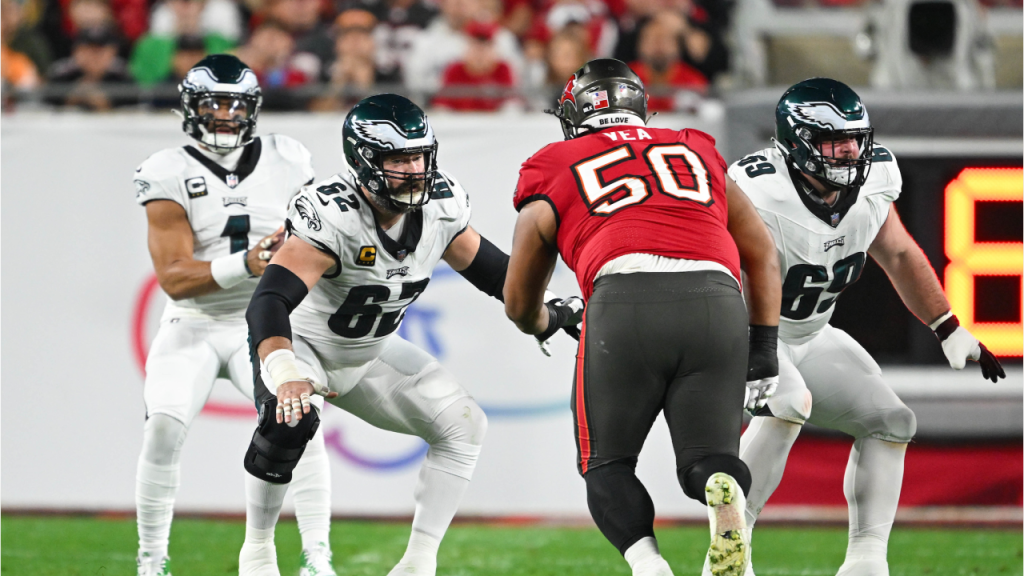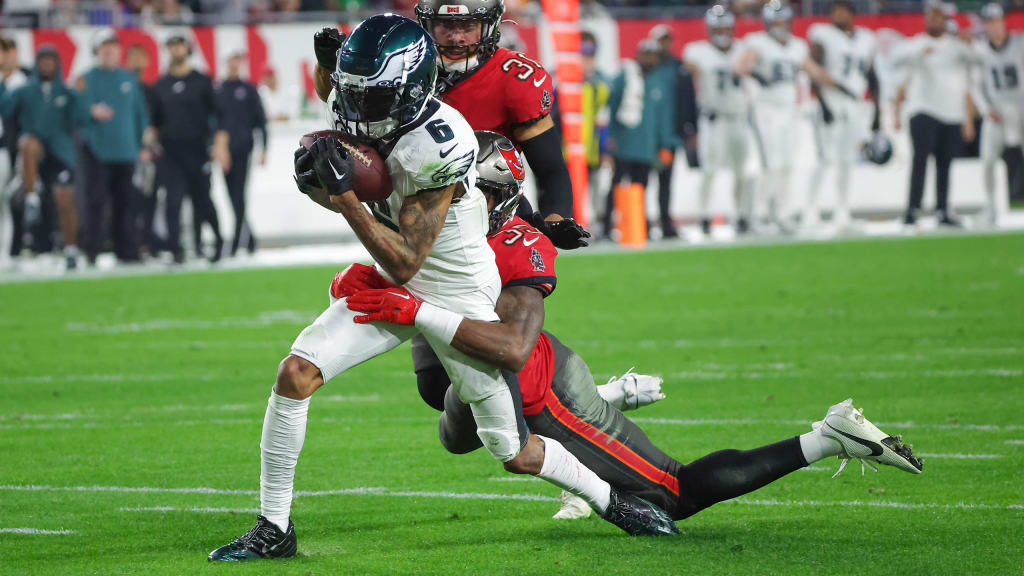Fashion 2023
Spadaro: 10 takeaways from a season-ending loss in Tampa Bay
Key Moments That Shaped Spadaro’s Season-Ending Loss in Tampa Bay
Spadaro: 10 Takeaways from a Season-Ending Loss in Tampa Bay
The Philadelphia Eagles’ season came to a disappointing end with a loss to the Tampa Bay Buccaneers. As the dust settles on this defeat, it’s important to reflect on the key moments that shaped the outcome of the game. In this article, we will delve into the 10 takeaways from the Eagles’ season-ending loss in Tampa Bay.
Firstly, the Eagles’ offense struggled to find its rhythm throughout the game. Quarterback Jalen Hurts faced constant pressure from the Buccaneers’ defense, resulting in several sacks and disrupted plays. This lack of offensive consistency ultimately hindered the team’s ability to put points on the board.
Secondly, the absence of key players due to injuries was a significant factor in the Eagles’ defeat. The team was without star tight end Zach Ertz and wide receiver DeSean Jackson, which limited their offensive options and playmaking abilities. The Buccaneers took advantage of this weakness and effectively shut down the Eagles’ passing game.
Thirdly, the Eagles’ defense had difficulty containing the Buccaneers’ potent offense. Tom Brady, the Buccaneers’ quarterback, had a field day against the Eagles’ secondary, throwing for multiple touchdowns and exploiting defensive vulnerabilities. The lack of pressure on Brady allowed him to pick apart the Eagles’ defense with ease.
Fourthly, turnovers proved to be costly for the Eagles. Hurts threw two interceptions, one of which was returned for a touchdown by the Buccaneers. These turnovers not only halted potential scoring opportunities for the Eagles but also gave the Buccaneers a significant advantage in terms of field position.
Fifthly, penalties plagued the Eagles throughout the game. Costly infractions, such as unnecessary roughness and false starts, disrupted the team’s momentum and extended Buccaneers’ drives. These mental lapses proved detrimental to the Eagles’ chances of mounting a comeback.
Sixthly, the Eagles’ running game was largely ineffective against the Buccaneers’ stout defensive front. Miles Sanders, the Eagles’ lead running back, struggled to find running lanes and was often met with resistance at the line of scrimmage. This lack of a consistent ground attack put additional pressure on Hurts and the passing game.
Seventhly, the Eagles’ special teams unit had a forgettable performance. A missed field goal and a blocked punt resulted in missed scoring opportunities and gave the Buccaneers favorable field position. These miscues further compounded the Eagles’ struggles and allowed the Buccaneers to maintain control of the game.
Eighthly, the Eagles’ coaching decisions came under scrutiny during the game. Questionable play-calling and conservative strategies limited the team’s ability to mount a comeback. The lack of aggressiveness in crucial situations prevented the Eagles from capitalizing on potential scoring opportunities.
Ninthly, the Buccaneers’ superior game plan and execution were evident throughout the game. Their ability to exploit the Eagles’ weaknesses and capitalize on turnovers and penalties proved to be the difference-maker. The Buccaneers’ experience and championship pedigree shone through, highlighting the gap between the two teams.
Lastly, the Eagles’ season-ending loss in Tampa Bay serves as a valuable learning experience for the team. It highlights areas of improvement and provides valuable insights into the team’s strengths and weaknesses. As the offseason approaches, the Eagles’ coaching staff and players will undoubtedly analyze this defeat to make the necessary adjustments for future success.
In conclusion, the Eagles’ season-ending loss in Tampa Bay was a disappointing end to their campaign. However, it is crucial to reflect on the key moments that shaped the outcome of the game. From offensive struggles to defensive vulnerabilities, turnovers, penalties, and coaching decisions, there are several takeaways that the Eagles can learn from. This defeat serves as a stepping stone for the team’s growth and development, as they aim to bounce back stronger in the future.
Analyzing Spadaro’s Performance in the Season-Ending Loss: Lessons Learned
Spadaro: 10 Takeaways from a Season-Ending Loss in Tampa Bay
The season-ending loss in Tampa Bay was a disappointing end to what had been a promising season for Spadaro. As we analyze his performance in this crucial game, there are several key takeaways that can be learned from this experience.
Firstly, it is clear that Spadaro struggled to find his rhythm in the game. He seemed hesitant and unsure of himself, which resulted in missed opportunities and costly mistakes. This highlights the importance of mental preparation and confidence in high-pressure situations.
Additionally, Spadaro’s decision-making was questionable at times. He often forced passes into tight coverage, leading to interceptions and turnovers. This emphasizes the need for better judgment and patience when under pressure, as well as the importance of reading the defense and making smart choices.
Furthermore, Spadaro’s accuracy was inconsistent throughout the game. While he made some impressive throws, there were also many instances where he missed open receivers or threw inaccurate passes. This highlights the need for continued practice and refinement of his throwing mechanics.
Another takeaway from this game is the importance of a strong offensive line. Spadaro was constantly under pressure from the Tampa Bay defense, which disrupted his timing and forced him into difficult situations. This emphasizes the need for a solid offensive line that can provide adequate protection and give the quarterback time to make plays.
In addition to the offensive line, Spadaro’s performance also highlighted the importance of a reliable receiving corps. While he had some receivers who made impressive catches, there were also instances where receivers dropped passes or failed to get open. This emphasizes the need for a cohesive and talented group of receivers who can consistently make plays.
Furthermore, Spadaro’s performance in this game highlighted the importance of adaptability. As the game progressed, the Tampa Bay defense made adjustments that seemed to stifle Spadaro’s effectiveness. This emphasizes the need for quarterbacks to be able to adapt to changing circumstances and find new ways to exploit the defense.
Another takeaway from this game is the importance of a strong running game. Spadaro was often forced to rely heavily on his passing game due to a lack of success in the running game. This made the offense predictable and easier for the Tampa Bay defense to defend against. This highlights the need for a balanced offensive attack that can keep the defense guessing.
Additionally, Spadaro’s performance in this game highlighted the importance of leadership. As the quarterback, he is expected to be a leader on the field and rally his team in difficult situations. However, there were instances where Spadaro seemed to lack the necessary leadership qualities, which may have contributed to the team’s struggles.
Lastly, this game served as a reminder of the importance of resilience and perseverance. Despite the disappointing outcome, Spadaro continued to fight until the final whistle, never giving up on his team. This serves as a valuable lesson for all athletes, highlighting the need to stay focused and determined even in the face of adversity.
In conclusion, the season-ending loss in Tampa Bay provided several key takeaways for Spadaro and his team. From the importance of mental preparation and decision-making to the need for a strong offensive line and receiving corps, there are many lessons to be learned from this experience. By analyzing and addressing these areas of improvement, Spadaro can continue to grow and develop as a quarterback, ultimately leading his team to success in future seasons.




